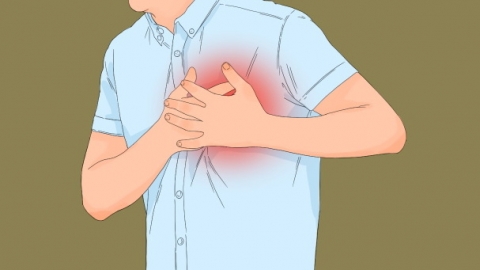What are the symptoms of myocarditis?
Generally, the main symptoms of myocarditis include fever, chest tightness and pain, palpitations, fatigue, and shortness of breath. If discomfort symptoms occur, it is recommended to seek timely diagnosis and treatment at a regular hospital. Detailed analysis is as follows:
1. Fever
Myocarditis is often triggered by infections with pathogens such as viruses or bacteria. After invading the body, these pathogens activate the immune system, leading to the release of inflammatory factors that stimulate the body's temperature-regulating center, causing fever. Patient body temperatures are usually between 37.5°C and 39°C. Some severe cases may develop high fever, with varying durations of fever often accompanied by general discomfort such as headache and muscle pain.

2. Chest tightness and chest pain
Pathogens or inflammatory factors can damage myocardial cells, causing myocardial inflammation, which leads to myocardial ischemia and hypoxia. Inflammation may also irritate the pericardium or pleura, causing chest tightness and pain. Patients often feel chest oppression and dyspnea. The chest pain is typically dull, aching, or stabbing, located behind the sternum or in the precordial area, and may worsen after physical activity.
3. Palpitations
Myocardial inflammation can cause abnormal myocardial contractility or affect the heart's electrical conduction system, leading to arrhythmia and palpitations. Patients may feel rapid, forceful, or irregular heartbeats, and can distinctly feel their heartbeat even at rest. Some individuals may also experience anxiety or nervousness.
4. Fatigue
When the myocardium is damaged, its contractile capacity decreases, weakening the heart’s pumping function and causing insufficient blood supply to various organs. Simultaneously, inflammation consumes significant energy, leading to fatigue. Patients often feel physically exhausted and mentally sluggish, easily tired even after mild activity. In severe cases, they may be unable to walk or stand normally.
5. Shortness of breath
As myocardial inflammation worsens, the heart's pumping ability declines, causing impaired pulmonary blood return, pulmonary congestion, impaired gas exchange, and resulting in dyspnea. Patients may experience rapid and labored breathing after physical activity. In severe cases, symptoms may worsen when lying flat, requiring sitting up for relief. Some patients may also experience coughing and sputum production.
If you experience any of the above symptoms, you should rest in bed, avoid strenuous exercise and excessive fatigue; maintain good indoor air circulation and avoid emotional excitement; and eat bland, easily digestible foods rich in high-quality protein and vitamins, avoiding spicy or irritating foods.










